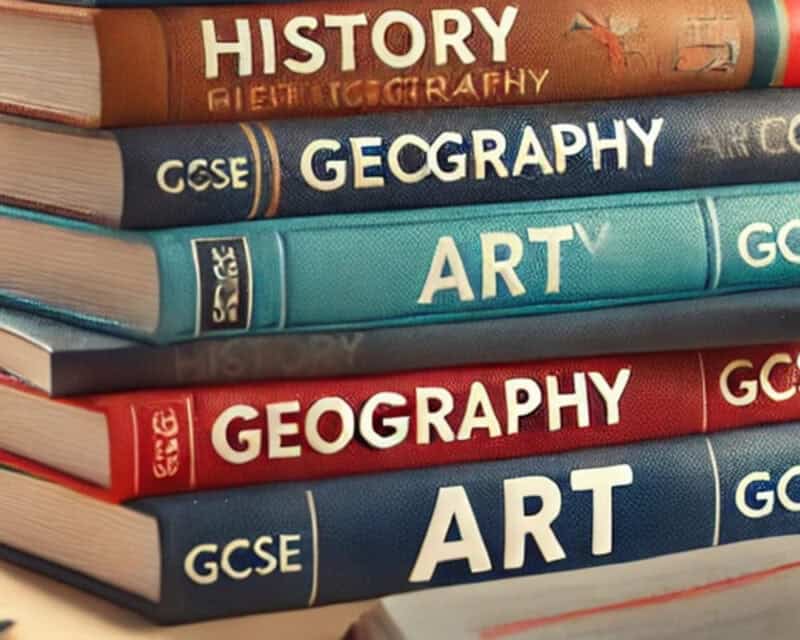When your child starts secondary school, it can feel like the beginning of the end of their education journey. While college and university are still ahead, choosing GCSE options in Year 9 is pivotal. Having been through this process twice before—and now on our third—I know how overwhelming it can be, even with experience. Every child is different, and making the right GCSE subject choices can shape their future opportunities.
Understanding GCSE Options

In Year 9, students must decide which GCSE subjects to take for Years 10 and 11. Most students in the UK take between 8 and 10 GCSEs, which typically include both compulsory and optional GCSE subjects. Choosing your GCSE subjects wisely is essential to building a strong foundation for their future.
Core Requirements: Compulsory GCSE Subjects
Every student must take the core subjects, which include:
- GCSE Math
- GCSE English Language and GCSE English Literature
- Science GCSEs, which can be combined science GCSE (worth two GCSEs) or separate sciences (Physics GCSE, Chemistry GCSE, and Biology GCSE)
- Other subjects may include PE, Citizenship, and Computer Science GCSE, depending on the school.
Choosing Your GCSE Options
Beyond the compulsory subjects, students can choose additional GCSEs based on their strengths and interests. These can often include subjects like:
Popular Options
- Humanity Subjects: GCSE History or GCSE Geography
- GCSE Modern Foreign Languages: Spanish, French, or German
- Arts Subjects: Media Studies GCSE, Film Studies GCSE, Music GCSE, or Drama GCSE
- Technical Subjects: Design Technology GCSE, Food Technology GCSE, or Engineering GCSE
- Computer Science GCSE: A valuable subject for students interested in technology careers
Some schools require students to choose at least one humanities subject and one modern foreign language. However, students should select subjects based on their abilities and interests to maintain motivation into year 11.
EBACC and Non-EBACC Routes
Some schools encourage students to follow the English Baccalaureate (EBACC) route, which requires students to take:
- Math GCSE
- English Language and English Literature GCSEs
- Science GCSEs (Combined or Separate Sciences)
- A Humanity Subject (History or Geography GCSE)
- A Modern Foreign Language (Spanish, French, or German GCSE)
The EBACC is designed to provide a broad academic foundation and is often recommended for future university students. However, not all students are required to take the EBACC route, and some schools offer more flexibility by allowing students to choose subjects outside of these requirements.
The non-EBACC route provides students with more freedom to explore subjects that align with their interests and career aspirations. These might include vocational subjects, arts-based GCSEs, or other technical subjects. Schools vary in how they structure their GCSE options, so it’s worth checking how your child’s school approaches this choice.
Key Questions to Ask When Choosing GCSE Subjects
As a parent, it is crucial to support your child in making the best decisions for their GCSEs. Here are some questions I have learned to ask during this process:
1. What subjects at GCSE level are compulsory?
Ensure your child understands the core requirements and any additional subjects their school may require.
2. Are There Any Subjects You Recommend for My Child?
Teachers have insight into your child’s strengths and weaknesses. They can provide guidance on whether certain GCSE subjects suit them academically. For instance, the history GCSE examination can be very essay-based. In contrast, geography has more multiple-choice questions and a few longer ones, so if your child isn’t great at writing lengthy pieces of work, geography may give them a better chance of securing a GCSE pass.
3. How Many GCSEs Should My Child Take?
While the average is 10 GCSEs, some students may take more or fewer depending on their abilities and workload. Our secondary school only offers 8 or 9 subjects, so the students don’t feel stretched too thin and can focus on getting quality over quantity in their marks.
4. What Is the Workload for Each Subject?
Some subjects, such as GCSE History, require strong essay writing skills, while Physics GCSE, Chemistry GCSE, and Biology GCSE demand an understanding of the principles and theoretical knowledge. Understanding the expected workload can help your child balance their studies.
To gain a greater understanding, you can ask what examination board your school uses for each subject and then read up on their websites for further information about the relevant examinations and resources for per subject.
AQA | Pearson Edexcel | OCR
5. What Percentage of the Final Grade Is Coursework vs. Exam?
Some GCSEs rely heavily on final exams, while others include coursework. If your child struggles with exam pressure, choosing subjects with a coursework component may be beneficial.
6. What GCSEs Are Essential for My Child’s Career Interests?
If your child has a specific career in mind, research the required GCSEs. For example:
- Medicine: Requires Physics GCSE, Chemistry GCSE, and Biology GCSE
- Engineering: Prefers Maths GCSE and Physics GCSE
- Computer Science: Encourages Math and Computer Science GCSE
However, remind your child that many career paths remain open, even if they are unsure of their goals.
GCSE Options for 2025 and Beyond

As GCSE subject options evolve, schools may introduce new GCSE courses, offering students a wide range of subjects. Schools in England and Wales continuously update their curriculum, so reviewing the options available for your child’s year group is essential. Things have changed considerably in our schools for each child who has sat their GCSEs, so attend any meetings you are offered and keep talking to your child about what they want and how they feel.
Final Thoughts on Choosing GCSE Subjects
After going through this process with our first two children, we’ve learned that there is no perfect formula for choosing the right GCSE subjects. Each child is unique, and the best approach is to balance their strengths, interests, and future aspirations.
Please encourage your child to choose GCSEs that align with their abilities and passions while considering future opportunities. They are more likely to work hard in a subject they enjoy than one they find difficult or tedious. A wide range of GCSE subjects can provide a solid foundation for their next steps, whether A-Levels, apprenticeships, or vocational courses.
It is also worth noting that they should not choose a subject based on their friends or the teacher taking the subject, as the teachers and friendships can change or leave.
Selecting your GCSE subjects can feel overwhelming, but with the right support and guidance, your child can make informed decisions that set them up for success. Good luck with the GCSE options journey—the third time’s a charm!

